Russia Today

The BBC reports that two Russian nationals have been named as suspects in the chemical nerve agent attack in Salisbury earlier this year.
Just as it did over the poisoning of Alexander Litvinenko with radioactive polonium in 2006 the Russian Government has mocked the investigation by the Police and UK security services.
Jeremy Corbyn, by the way, originally wanted the UK Government to send a sample of the nerve agent, Novichok, to the Russians and ask them if it was 'theirs'.
What a complete fool the Labour leader is - and a liability.
https://www.bbc.co.uk/news/uk-45421445
Salisbury Novichok poisoning: Russian nationals named as suspects
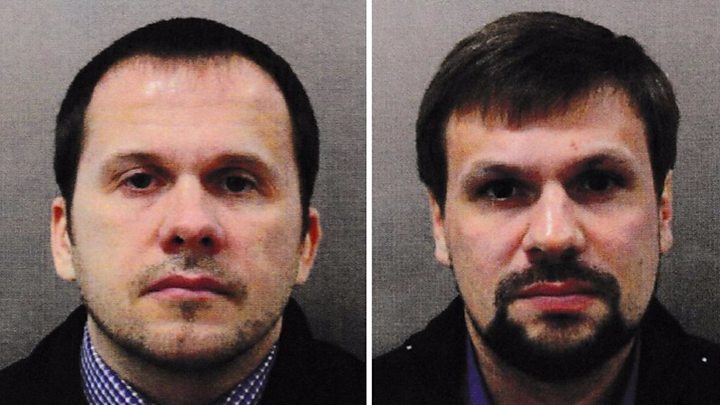
Media caption - Police are appealing for information on Alexander Petrov (left) and Ruslan Boshirov
Two Russian nationals have been named as suspects in the attempted murder of former Russian spy Sergei Skripal and his daughter Yulia.
The men, using the names Alexander Petrov and Ruslan Boshirov, are thought to be officers from Russia's military intelligence service, the PM said.
Scotland Yard and the CPS say there is enough evidence to charge the men.
Mr Skripal, 66, and his daughter Yulia, 33, were poisoned with the nerve agent Novichok in March.
Det Sgt Nick Bailey also fell ill after responding to the incident in Salisbury.
Police are linking the attack to a separate Novichok poisoning on 30 June, when Dawn Sturgess and Charlie Rowley became unwell at a house in Amesbury, about eight miles from Salisbury.
Ms Sturgess died in hospital on 9 July. Mr Rowley was discharged from hospital on 20 July.
- Salisbury poisoning suspects: Latest updates
- What happened to the Skripals?
- Why Novichok stays deadly for so long
The poisoning was "not a rogue operation" and was "almost certainly" approved at a senior level of the Russian state, she said.
"We must now step up our collective efforts specifically against the GRU," she added.
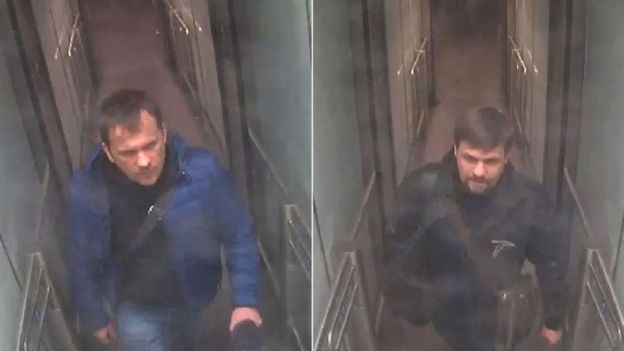
Image copyright - MET POLICE Image caption - Police released CCTV showing the two men at Gatwick Airport
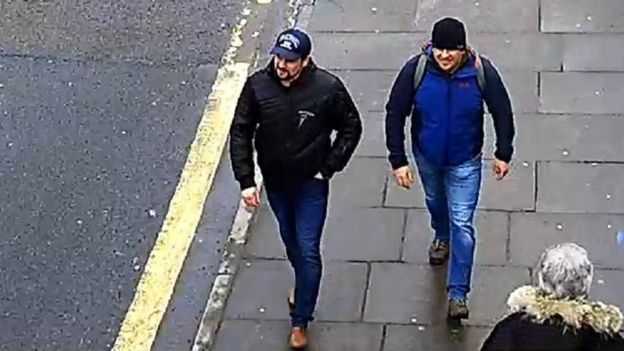
Image copyright - MET POLICE Image caption - They were then seen in Salisbury on 4 March, having visited for reconnaissance the previous day
Mrs May promised "the full range of tools from across our national security apparatus" would be used to "counter the threat" caused by Russia.
She condemned the "despicable attack" which "left four people fighting for their lives and one innocent woman dead".
Labour leader Jeremy Corbyn said the use of military-grade nerve agent on the streets of Britain was an "outrage and beyond reckless".
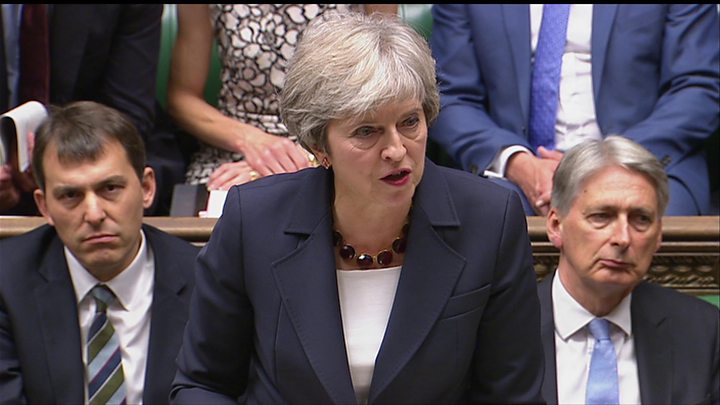
Media caption - Theresa May gave a statement at Prime Minister's Questions
The two suspects, believed to have been using aliases, travelled on Russian passports and are thought to be aged about 40.
The CPS is not applying to Russia for the extradition of the two men, as Russia does not extradite its own nationals.
But a European Arrest Warrant has been obtained in case they travel to the EU.
'Doesn't mean much'
Russian President Vladimir Putin's foreign policy adviser Yuri Ushakov told reporters the names of the two Russian men suspected in the poisoning "do not mean anything to me".
Andrey Kortunoy, director general of the Russian International Affairs Council, said the Kremlin will question everything the UK has said and "the fact that you have two photos and two maybe fake names doesn't mean too much".
Russia's RIA news agency has since reported that Russia's charge d'affaires in London - the embassy's top diplomat - was summoned by the UK on Wednesday.
Meanwhile Interfax news agency reports that Britain's ambassador to Russia has met with the Russian foreign ministry.
The UK will meet the UN security council to discuss the case on Thursday.
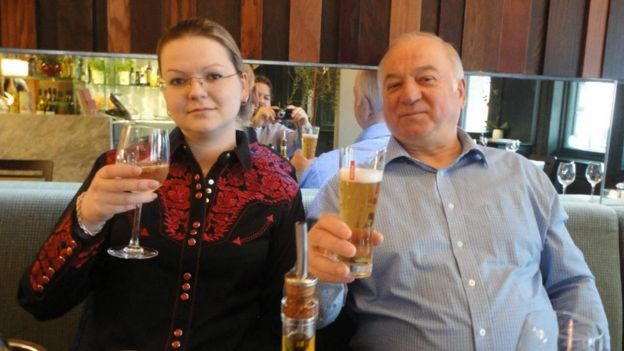
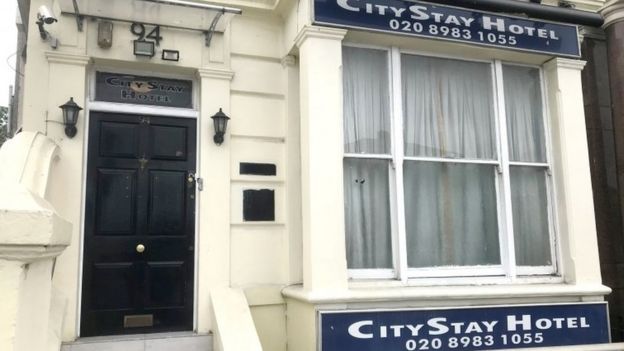
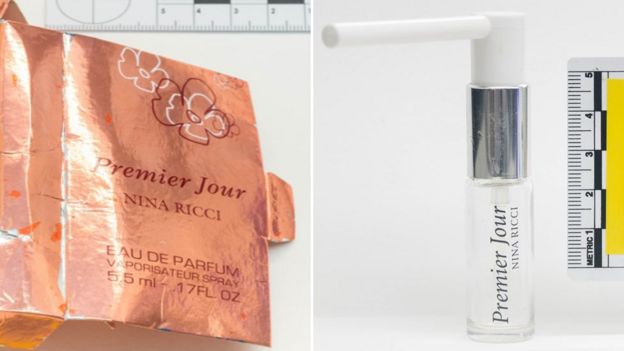
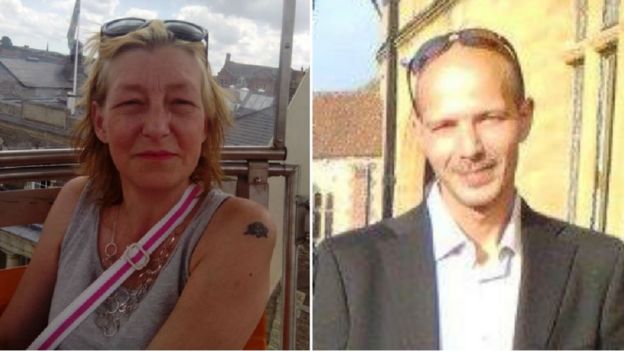
Mrs May promised "the full range of tools from across our national security apparatus" would be used to "counter the threat" caused by Russia.
She condemned the "despicable attack" which "left four people fighting for their lives and one innocent woman dead".
Labour leader Jeremy Corbyn said the use of military-grade nerve agent on the streets of Britain was an "outrage and beyond reckless".

Media caption - Theresa May gave a statement at Prime Minister's Questions
The two suspects, believed to have been using aliases, travelled on Russian passports and are thought to be aged about 40.
The CPS is not applying to Russia for the extradition of the two men, as Russia does not extradite its own nationals.
But a European Arrest Warrant has been obtained in case they travel to the EU.
'Doesn't mean much'
Russian President Vladimir Putin's foreign policy adviser Yuri Ushakov told reporters the names of the two Russian men suspected in the poisoning "do not mean anything to me".
Andrey Kortunoy, director general of the Russian International Affairs Council, said the Kremlin will question everything the UK has said and "the fact that you have two photos and two maybe fake names doesn't mean too much".
Russia's RIA news agency has since reported that Russia's charge d'affaires in London - the embassy's top diplomat - was summoned by the UK on Wednesday.
Meanwhile Interfax news agency reports that Britain's ambassador to Russia has met with the Russian foreign ministry.
The UK will meet the UN security council to discuss the case on Thursday.

Image caption - Yulia and Sergei Skripal fell ill after Mr Skripal's front door was sprayed with Novichok
Sue Hemming, CPS director of legal services, said there was enough evidence "to provide a realistic prospect of conviction" and that it was "clearly in the public interest to charge Alexander Petrov and Ruslan Boshirov".
The offences include conspiracy to murder Sergei Skripal; the attempted murder of Sergei Skripal, Yulia Skripal and Nick Bailey; the use and possession of Novichok contrary to the Chemical Weapons Act; and causing grievous bodily harm with intent to Yulia Skripal and Nick Bailey.
Scotland Yard's Assistant Commissioner Neil Basu, the head of UK counter-terrorism policing, said on Wednesday that Det Sgt Bailey "continues to make good progress but remains off work".
Sue Hemming, CPS director of legal services, said there was enough evidence "to provide a realistic prospect of conviction" and that it was "clearly in the public interest to charge Alexander Petrov and Ruslan Boshirov".
The offences include conspiracy to murder Sergei Skripal; the attempted murder of Sergei Skripal, Yulia Skripal and Nick Bailey; the use and possession of Novichok contrary to the Chemical Weapons Act; and causing grievous bodily harm with intent to Yulia Skripal and Nick Bailey.
Scotland Yard's Assistant Commissioner Neil Basu, the head of UK counter-terrorism policing, said on Wednesday that Det Sgt Bailey "continues to make good progress but remains off work".
What happens now?
Analysis by BBC News diplomatic correspondent Jonathan Marcus
The decision to name two Russian individuals as suspects in the Skripal case is a significant development - raising the level of evidence on which the British government's charges are based and potentially giving added weight to calls for additional international sanctions against Moscow.
The US, along with a swathe of Britain's allies, expelled a significant number of Russian diplomats (many thought to be intelligence agents) in the wake of the initial evidence that a Russian military grade nerve agent had been used in the Salisbury attack.
Britain will be hoping that other countries may now show more enthusiasm for stepped-up sanctions.
Analysis by BBC News diplomatic correspondent Jonathan Marcus
The decision to name two Russian individuals as suspects in the Skripal case is a significant development - raising the level of evidence on which the British government's charges are based and potentially giving added weight to calls for additional international sanctions against Moscow.
The US, along with a swathe of Britain's allies, expelled a significant number of Russian diplomats (many thought to be intelligence agents) in the wake of the initial evidence that a Russian military grade nerve agent had been used in the Salisbury attack.
Britain will be hoping that other countries may now show more enthusiasm for stepped-up sanctions.
The Metropolitan Police said the two men arrived at Gatwick Airport from Moscow on 2 March and stayed at the City Stay Hotel in Bow Road, east London.
On 4 March they travelled to Salisbury - having also visited for reconnaissance the previous day - where Mr Skripal's front door was contaminated with Novichok.
Officers believe a modified perfume bottle was used to spray the door.
The pair flew from Heathrow to Moscow later that night.
While traces of Novichok were found in the London hotel room, there is no risk to other guests who were staying at the hotel at the time, police said.
They now want to hear from anyone who was a guest there from 4 March to 4 May.
London Mayor Sadiq Khan said he had been assured by Transport for London and police that there was no risk to public health in London.
On 4 March they travelled to Salisbury - having also visited for reconnaissance the previous day - where Mr Skripal's front door was contaminated with Novichok.
Officers believe a modified perfume bottle was used to spray the door.
The pair flew from Heathrow to Moscow later that night.
While traces of Novichok were found in the London hotel room, there is no risk to other guests who were staying at the hotel at the time, police said.
They now want to hear from anyone who was a guest there from 4 March to 4 May.
London Mayor Sadiq Khan said he had been assured by Transport for London and police that there was no risk to public health in London.

Image copyright - PA Image caption - The hotel in east London, where police say Alexander Petrov and Ruslan Boshirov stayed before they travelled to Salisbury, is 'open for business as usual'
Police said Ms Sturgess and Mr Rowley were later exposed to Novichok after handling a contaminated container, labelled as Nina Ricci Premier Jour perfume.
Mr Rowley told police he found the box containing the small bottle and an applicator - all later found to be counterfeit - in a charity bin.
He tried to put the two parts together and got some of the contents on himself. His partner Ms Sturgess applied some of the contents to her wrists and became unwell.
Police said Ms Sturgess and Mr Rowley were later exposed to Novichok after handling a contaminated container, labelled as Nina Ricci Premier Jour perfume.
Mr Rowley told police he found the box containing the small bottle and an applicator - all later found to be counterfeit - in a charity bin.
He tried to put the two parts together and got some of the contents on himself. His partner Ms Sturgess applied some of the contents to her wrists and became unwell.

Image copyright - AFP/MET POLICE Image caption - The counterfeit perfume bottle recovered from Mr Rowley's home and the box police say it came in.
The bottle, with a modified nozzle, had contained a "significant amount" of Novichok, Scotland Yard said.
Mr Basu said: "We don't yet know where the suspects disposed of the Novichok they used to attack the door, where Dawn and Charlie got the bottle that poisoned them, or if it is the same bottle used in both poisonings."
But he added that "the manner in which the bottle and packaging has been adapted makes it a perfect cover for smuggling the weapon into the country, and a perfect delivery method for the attack against the Skripal's front door".
The bottle, with a modified nozzle, had contained a "significant amount" of Novichok, Scotland Yard said.
Mr Basu said: "We don't yet know where the suspects disposed of the Novichok they used to attack the door, where Dawn and Charlie got the bottle that poisoned them, or if it is the same bottle used in both poisonings."
But he added that "the manner in which the bottle and packaging has been adapted makes it a perfect cover for smuggling the weapon into the country, and a perfect delivery method for the attack against the Skripal's front door".

Image copyright - FACEBOOK Image caption - Dawn Sturgess and Charlie Rowley were also poisoned by Novichok
Mr Basu confirmed that the two poisoning cases were related.
"It now forms one investigation," he said. "We do not believe Dawn and Charlie were deliberately targeted, but became victims as a result of the recklessness in which such a toxic nerve agent was disposed of."
Mr Basu confirmed that the two poisoning cases were related.
"It now forms one investigation," he said. "We do not believe Dawn and Charlie were deliberately targeted, but became victims as a result of the recklessness in which such a toxic nerve agent was disposed of."
The reaction from Russia
BBC Monitoring
Political talk shows on the main Kremlin-controlled national channels interrupted their broadcasts to mention the news.
Sarcasm and disbelief at the British government's actions were the dominant themes in reaction to what they call the "Skripal affair".
"We are expecting new sanctions, of course - with pleasure," a prominent talk show host said live on air on channel Rossiya 1.
Over on Channel One, a host said that even though it had taken Britain "roughly half a year" to name the suspects, sanctions had been imposed on Russia long before this.
"Is this how this just world, where everyone loves each other, looks like?" he asked a guest advocating that the Kremlin soften its policy towards the West.

The Guardian reports that Russian state TV has been 'mocking' the assassination attempt on a former spy, Sergie Skripal, and his daughter, Yulia, as well as making fun of the demise of other Russian nationals who have died in mysterious circumstances while living in the UK.
Moscow has complained that the coverage of these terrible events in the western media amounts to an 'anti-Russian campaign', but the facts speak for themselves and the pattern of behaviour point to a deliberate policy of state sanctioned murder.
https://www.theguardian.com/world/2018/mar/09/russian-state-tv-warns-traitors-not-to-settle-in-england
Russian state TV warns 'traitors' not to settle in England
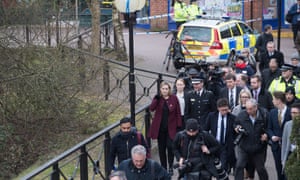
After Salisbury poisoning, host says there have been ‘too many strange incidents’ in recent years
By Marc Bennetts - The Guardian
Russian state television has warned “traitors” and Kremlin critics that they should not settle in England because of an increased risk of dying in mysterious circumstances.
“Don’t choose England as a place to live. Whatever the reasons, whether you’re a professional traitor to the motherland or you just hate your country in your spare time, I repeat, no matter, don’t move to England,” the presenter Kirill Kleymenov said during a news programme on Channel One, state TV’s flagship station.
“Something is not right there. Maybe it’s the climate. But in recent years there have been too many strange incidents with a grave outcome. People get hanged, poisoned, they die in helicopter crashes and fall out of windows in industrial quantities,” Kleymenov said.
The stark warning comes as the former Russian double agent Sergei Skripal and his daughter, Yulia, remain critically ill in hospital after being poisoned with a nerve agent in Salisbury. Moscow has labelled speculation that they were targeted by the Kremlin security services as an “anti-Russian campaign”.
A number of Kremlin critics have met grisly ends in Britain in recent years. Boris Berezovsky, an oligarch turned government critic, was found hanged at his home in Berkshire in March 2013. The coroner delivered an open verdict. Alexander Litvinenko, a former FSB security service officer, died in 2006 after being poisoned with polonium-210 in the lobby of a Mayfair hotel, allegedly by Russian hitmen. Vladimir Putin dismissed accusations of Russian involvement.
In 2012, Alexander Perepilichnyy, a former banker who was helping Swiss prosecutors investigate a Russian-linked money-laundering scheme, died after collapsing in Surrey. A pre-inquest hearing heard that traces of a chemical that can be found in the poisonous plant gelsemium were later found in his stomach. The inquest is due to resume next month.
Stephen Curtis, a millionaire lawyer with close ties to the exiled Russian tycoon Mikhail Khodorkovsky, died when his helicopter crashed close to Bournemouth airport in 2004. Curtis is reported to have told a close relative that if he were to die, it would not be an accident. One of Curtis’s associates, Scot Young, who had business links to Berezovsky, was found impaled on railings after falling from his apartment in Marylebone, central London, in 2014. The coroner found insufficient evidence to rule it a suicide, and his family suspect he was murdered.
The BBC reports on a incident in the normally quiet county of Wiltshire involving a former Russian spy, Sergei Skripal, who appears to be the victim of some kind of mysterious poisoning.
Lots more to follow on this story I'm sure including, no doubt, a statement from President Vladimir Putin denying any involvement of the Russian state.
Putin's denial will follow a long line of similar denials such as:
http://www.bbc.co.uk/news/uk-43295134
Critically ill man is former Russian spy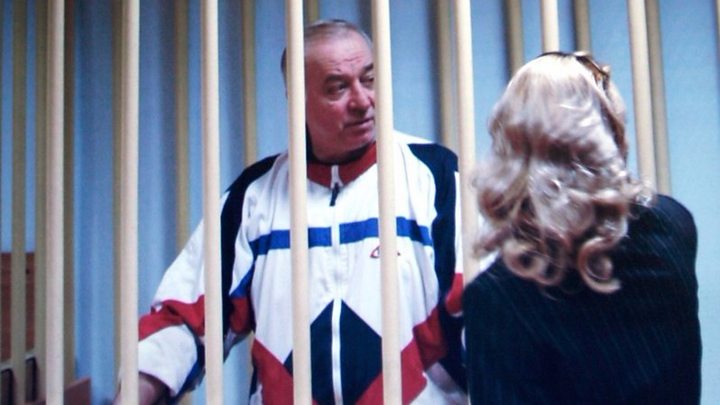
Media caption - "He was doing strange hand movements, looking up to the sky": What we know so far
A man who is critically ill after being exposed to an unknown substance in Wiltshire is a Russian national convicted of spying for Britain, the BBC understands.
Sergei Skripal, 66, was granted refuge in the UK following a "spy swap" between the US and Russia in 2010.
He and a woman, 33, were found unconscious on a bench at a shopping centre in Salisbury on Sunday.
Zizzi restaurant in Salisbury has been closed by police "as a precaution".
The substance has not been identified.
Wiltshire Police are investigating whether a crime has been committed. They said the pair had no visible injuries but had been found unconscious at the Maltings shopping centre.
They have declared a "major incident" and multiple agencies are investigating. They said it had not been declared as a counter-terrorism incident, but they were keeping an "open mind".
They said officers did not believe there was any risk to the wider public.
Col Skripal, who is a retired Russian military intelligence officer, was jailed for 13 years by Russia in 2006 for spying for Britain.

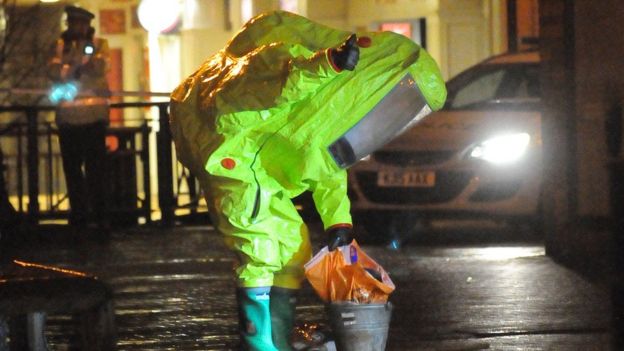
What were the charges against Col Skripal?
Col Skripal was convicted of "high treason in the form of espionage" by Moscow's military court in August 2006. He was stripped off all his titles and awards.
He was alleged by the Russian security service FSB to have begun working for the British secret services while serving in the army in the 1990s.
He had been passing information classified as state secrets and been paid for the work by MI6, the FSB claimed.
Col Skripal pleaded guilty at his trial and co-operated with investigators, reports said at the time.
BBC Monitoring
Political talk shows on the main Kremlin-controlled national channels interrupted their broadcasts to mention the news.
Sarcasm and disbelief at the British government's actions were the dominant themes in reaction to what they call the "Skripal affair".
"We are expecting new sanctions, of course - with pleasure," a prominent talk show host said live on air on channel Rossiya 1.
Over on Channel One, a host said that even though it had taken Britain "roughly half a year" to name the suspects, sanctions had been imposed on Russia long before this.
"Is this how this just world, where everyone loves each other, looks like?" he asked a guest advocating that the Kremlin soften its policy towards the West.
Moscow Mocks Assassination Attempts (10/03/18)
The Guardian reports that Russian state TV has been 'mocking' the assassination attempt on a former spy, Sergie Skripal, and his daughter, Yulia, as well as making fun of the demise of other Russian nationals who have died in mysterious circumstances while living in the UK.
Moscow has complained that the coverage of these terrible events in the western media amounts to an 'anti-Russian campaign', but the facts speak for themselves and the pattern of behaviour point to a deliberate policy of state sanctioned murder.
https://www.theguardian.com/world/2018/mar/09/russian-state-tv-warns-traitors-not-to-settle-in-england
Russian state TV warns 'traitors' not to settle in England

After Salisbury poisoning, host says there have been ‘too many strange incidents’ in recent years
By Marc Bennetts - The Guardian
Russian state television has warned “traitors” and Kremlin critics that they should not settle in England because of an increased risk of dying in mysterious circumstances.
“Don’t choose England as a place to live. Whatever the reasons, whether you’re a professional traitor to the motherland or you just hate your country in your spare time, I repeat, no matter, don’t move to England,” the presenter Kirill Kleymenov said during a news programme on Channel One, state TV’s flagship station.
“Something is not right there. Maybe it’s the climate. But in recent years there have been too many strange incidents with a grave outcome. People get hanged, poisoned, they die in helicopter crashes and fall out of windows in industrial quantities,” Kleymenov said.
The stark warning comes as the former Russian double agent Sergei Skripal and his daughter, Yulia, remain critically ill in hospital after being poisoned with a nerve agent in Salisbury. Moscow has labelled speculation that they were targeted by the Kremlin security services as an “anti-Russian campaign”.
A number of Kremlin critics have met grisly ends in Britain in recent years. Boris Berezovsky, an oligarch turned government critic, was found hanged at his home in Berkshire in March 2013. The coroner delivered an open verdict. Alexander Litvinenko, a former FSB security service officer, died in 2006 after being poisoned with polonium-210 in the lobby of a Mayfair hotel, allegedly by Russian hitmen. Vladimir Putin dismissed accusations of Russian involvement.
In 2012, Alexander Perepilichnyy, a former banker who was helping Swiss prosecutors investigate a Russian-linked money-laundering scheme, died after collapsing in Surrey. A pre-inquest hearing heard that traces of a chemical that can be found in the poisonous plant gelsemium were later found in his stomach. The inquest is due to resume next month.
Stephen Curtis, a millionaire lawyer with close ties to the exiled Russian tycoon Mikhail Khodorkovsky, died when his helicopter crashed close to Bournemouth airport in 2004. Curtis is reported to have told a close relative that if he were to die, it would not be an accident. One of Curtis’s associates, Scot Young, who had business links to Berezovsky, was found impaled on railings after falling from his apartment in Marylebone, central London, in 2014. The coroner found insufficient evidence to rule it a suicide, and his family suspect he was murdered.
Putin's Russia (06/03/18)
The BBC reports on a incident in the normally quiet county of Wiltshire involving a former Russian spy, Sergei Skripal, who appears to be the victim of some kind of mysterious poisoning.
Lots more to follow on this story I'm sure including, no doubt, a statement from President Vladimir Putin denying any involvement of the Russian state.
Putin's denial will follow a long line of similar denials such as:
- The murder of Alexander Litvinenko with radioactive Polonium in 2006
- Team Russia's systematic cheating in the Sochi Winter Olympics 2014
- The shooting down of civilian Flight MH17 over Eastern Ukraine in 2014
- Large, scale organised Russian interference in America's presidential election in 2016
In addition many of Putin's internal critics have died suddenly and violently including the Russian journalist Anna Politkovskaya and opposition politician Boris Nemtsov, both of whom were gunned down by assassins in Moscow.
http://www.bbc.co.uk/news/uk-43295134
Critically ill man is former Russian spy

Media caption - "He was doing strange hand movements, looking up to the sky": What we know so far
A man who is critically ill after being exposed to an unknown substance in Wiltshire is a Russian national convicted of spying for Britain, the BBC understands.
Sergei Skripal, 66, was granted refuge in the UK following a "spy swap" between the US and Russia in 2010.
He and a woman, 33, were found unconscious on a bench at a shopping centre in Salisbury on Sunday.
Zizzi restaurant in Salisbury has been closed by police "as a precaution".
The substance has not been identified.
Wiltshire Police are investigating whether a crime has been committed. They said the pair had no visible injuries but had been found unconscious at the Maltings shopping centre.
They have declared a "major incident" and multiple agencies are investigating. They said it had not been declared as a counter-terrorism incident, but they were keeping an "open mind".
They said officers did not believe there was any risk to the wider public.
Col Skripal, who is a retired Russian military intelligence officer, was jailed for 13 years by Russia in 2006 for spying for Britain.
He was convicted of passing the identities of Russian intelligence agents working undercover in Europe to the UK's Secret Intelligence Service, MI6.
Russia said Col Skripal had been paid $100,000 for the information, which he had been supplying from the 1990s.
He was one of four prisoners released by Moscow in exchange for 10 US spies in 2010, as part of a swap. Col Skripal was later flown to the UK.
He and the woman, who police said were known to each other, are both in intensive care at Salisbury District Hospital.
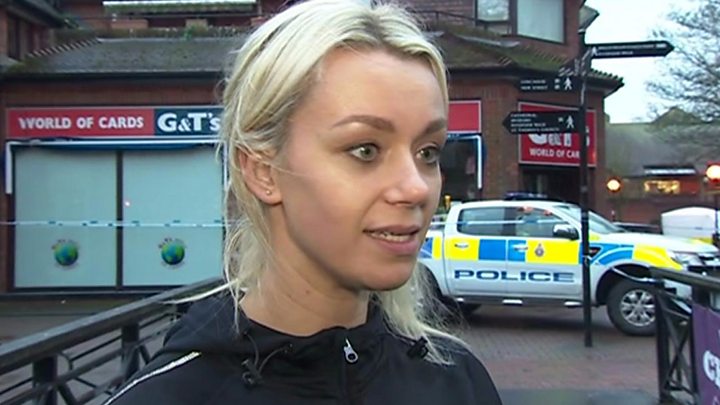
Media caption - Witness: "They looked like they'd been taking something quite strong"
A number of locations in the city centre were cordoned off and teams in full protective gear used hoses to decontaminate the street.
The hospital advised people to attend routine operations and outpatient appointments unless they were contacted. It said its A&E department was open but busy because of the weather.
Neighbours at Sergei Skripal's home in Salisbury say police arrived around 17:00 GMT on Sunday and have been there ever since.
They said he was friendly and in recent years had lost his wife.
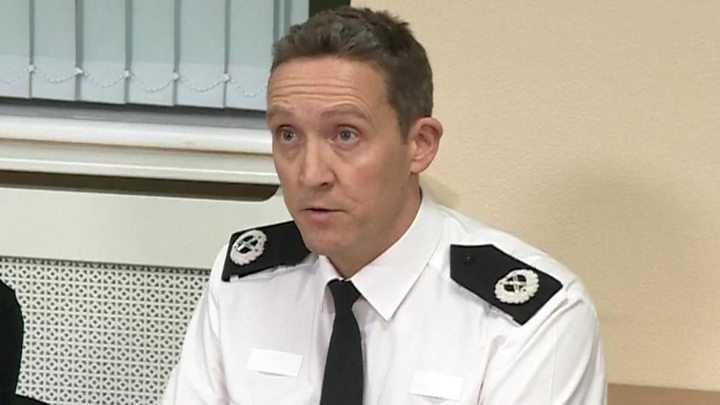
Media caption - Temp Asst Chief Constable Craig Holden: "We are unable to ascertain whether or not a crime has taken place"
Eyewitness Freya Church told the BBC it looked like the two people had taken "something quite strong".
She said: "On the bench there was a couple, an older guy and a younger girl. She was sort of leant in on him, it looked like she had passed out maybe.
"He was doing some strange hand movements, looking up to the sky...
"They looked so out of it I thought even if I did step in I wasn't sure how I could help."
Russia said Col Skripal had been paid $100,000 for the information, which he had been supplying from the 1990s.
He was one of four prisoners released by Moscow in exchange for 10 US spies in 2010, as part of a swap. Col Skripal was later flown to the UK.
He and the woman, who police said were known to each other, are both in intensive care at Salisbury District Hospital.

Media caption - Witness: "They looked like they'd been taking something quite strong"
A number of locations in the city centre were cordoned off and teams in full protective gear used hoses to decontaminate the street.
The hospital advised people to attend routine operations and outpatient appointments unless they were contacted. It said its A&E department was open but busy because of the weather.
Neighbours at Sergei Skripal's home in Salisbury say police arrived around 17:00 GMT on Sunday and have been there ever since.
They said he was friendly and in recent years had lost his wife.

Media caption - Temp Asst Chief Constable Craig Holden: "We are unable to ascertain whether or not a crime has taken place"
Eyewitness Freya Church told the BBC it looked like the two people had taken "something quite strong".
She said: "On the bench there was a couple, an older guy and a younger girl. She was sort of leant in on him, it looked like she had passed out maybe.
"He was doing some strange hand movements, looking up to the sky...
"They looked so out of it I thought even if I did step in I wasn't sure how I could help."

Image caption - Public Health England has not confirmed what the substance was

Image caption - The hospital's A&E was closed on Monday while two people were treated
The BBC's security correspondent Gordon Corera said government officials were not commenting about events in Salisbury, but that the possibility of an unexplained substance being involved will draw comparisons with the 2006 poisoning of Alexander Litvinenko.
Mr Litvinenko was a former intelligence officer who, an inquiry later found, was probably killed on the orders of Vladimir Putin.
Public Health England said its specialists would be joining a "specially convened group" to consider the incident.
The BBC's security correspondent Gordon Corera said government officials were not commenting about events in Salisbury, but that the possibility of an unexplained substance being involved will draw comparisons with the 2006 poisoning of Alexander Litvinenko.
Mr Litvinenko was a former intelligence officer who, an inquiry later found, was probably killed on the orders of Vladimir Putin.
Public Health England said its specialists would be joining a "specially convened group" to consider the incident.
What were the charges against Col Skripal?
Col Skripal was convicted of "high treason in the form of espionage" by Moscow's military court in August 2006. He was stripped off all his titles and awards.
He was alleged by the Russian security service FSB to have begun working for the British secret services while serving in the army in the 1990s.
He had been passing information classified as state secrets and been paid for the work by MI6, the FSB claimed.
Col Skripal pleaded guilty at his trial and co-operated with investigators, reports said at the time.

